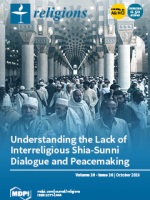Understanding the lack of Shia-Sunni dialogue and peacemaking
Despite a growth in organized violence with Shia-Sunni dimensions over the last two decades, less than one percent of the world’s interreligious peacemaking organizations are specialized in dialogue between Shias and Sunnis. This finding provides the point of departure for a new study by DIIS PhD Candidate Dino Krause, in cooperation with Isak Svensson from Uppsala University and Göran Larsson from Gothenburg University, which was recently published in the open-access journal Religions.
The study sets out to answer, why there are so few organizations specialized in this form of interreligious dialogue, despite high levels of intra-Muslim sectarian violence, and despite opinion surveys that have documented tensions among Shia and Sunni Muslims in different Northern African and Middle Eastern countries.
The study counters the argument of interreligious dialogue as such being alien to non-Western, Muslim societies, by providing a discussion of the historical trajectory of ‘ecumenical’ intra-Muslim efforts. These include the emergence of the pan-Islamism ideology, the attempts of the Muslim ruler Nadir Shah during the 18th century in India as well as the work of the Association for the Rapprochement of the Islamic Schools of Law, which was established at Al-Azhar University in Cairo in 1947.
A key argument in the study regards the geopolitical rivalry between Iran and Saudi Arabia. Since the Iranian Revolution in 1979, their respective governments have worked to undermine the ability of major regional organizations such as the Arabic League, the Gulf Cooperation Council and the Organization of Islamic Cooperation to engage in peacebuilding in Shia-Sunni conflicts. Moreover, Iran and Saudi Arabia have themselves contributed to escalating and manipulating existing sectarian tensions into severe proxy wars, with the ongoing civil war in Yemen being the most recent example.
On the other hand, while there is a lack of institutionalized Shia-Sunni peacemaking initiatives, more research is needed to examine to what extent such initiatives might be occurring on a more localized and informal basis. One such example that is discussed regards an initiative by Yusuf al-Qaradawi, a prominent Egyptian Islamic theologian, who tried to stop the sectarian violence in Iraq following the US-led invasion in 2003.
DIIS Experts



